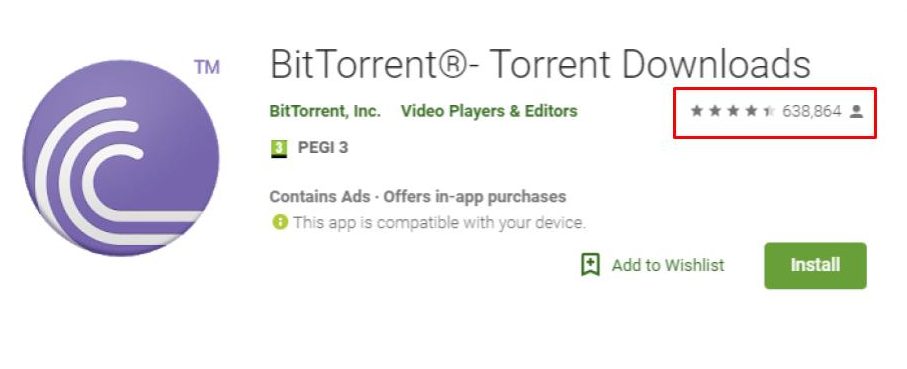uTorrent vs. BitTorrent –
Which is Faster for
Mobile/
Desktop in 2020?
When it comes to torrent clients, uTorrent and BitTorrent
are two veterans with huge, loyal followings.
But what makes one better than the other? Is it a greater variety of settings, or a richer package of features? Maybe speed or practicality is the deciding factor?
While uTorrent and BitTorrent are in fact very much alike, there are some key distinctions between the two. This article will help you understand the similarities and differences.
It will also teach you how using a VPN (virtual private network) can increase your download speeds, and protect you from the dangers of downloading torrents.
Specifically, it’s important to know that torrenting is not legal any where, and even where it is, some have been issued fines – and even arrested – for downloading copyrighted media.
However, with a VPN, your internet activity can’t be traced back to you. Therefore, no one will know what content you download, or even the fact that you’re downloading torrents at all.
That said, not all VPNs are the same.
Fortunately, we evaluated a ton of VPNs and figured out which are the best for downloading torrents. With their powerful security protocols and servers dedicated to torrenting, CyberGhost is a particularly good choice.
And if you’re really new to torrenting and want to learn how to do it safely and anonymously, check out this tutorial.
uTorrent and BitTorrent Have Nearly Identical Interfaces
If you’ve used both uTorrent and BitTorrent, you’ve probably wondered why their interfaces are almost identical. Indeed, if it wasn’t for the name and colors, you could easily mistake one for the other.
uTorrent Interface:
BitTorrent Interface:
That’s because they’re virtually the same software. Both clients are owned by BitTorrent, Inc.
BitTorrent (the client) was developed in 2001 to implement the BitTorrent protocol. At that time, uTorrent hadn’t yet been designed — in fact, initially it wasn’t even BitTorrent’s product. It started out as a one-man project in late 2004, and it was first released in September 2005. BitTorrent, Inc. acquired uTorrent in December 2006.
So, while BitTorrent was the first to implement the protocol, today both clients are run by the same company and use the same code. This doesn’t mean there aren’t any differences, but you won’t spot them at first glance.
So How Are They Different?
BitTorrent and uTorrent are sibling products, and as such, they share a lot of common features — interface, settings, unlimited downloading, free and paid versions, etc.
However, they are not exactly the same. Here are the differences:
1. Size: uTorrent is much lighter than BitTorrent. At less than 1 MB, uTorrent is much less taxing on your operating system than many other torrenting clients. By comparison, BitTorrent is almost 3 MB.
2. Frequency of Updates: uTorrent is constantly being developed, with alpha and beta versions being released, while BitTorrent only releases stable versions. That means that while you’ll get more cutting edge features with uTorrent, it might be at the expense of reliability.
3. Platform Compatibility: BitTorrent is compatible with Windows, Mac, and Android, but uTorrent is also available on Linux.
4. Cryptocurrency Mining: Both uTorrent and BitTorrent have partnered software offers during installation (often called “bloatware” by the less charitable). However, uTorrent has been known to have had a few slip ups in the past, including silently dropping crypto-miners in computers, which drain users’ CPU without their permission. This was obviously off-putting to many, so to avoid something like that happening to them, many users have gone as far as installing older versions of the client, despite the security risks of using outdated software.
But Which One is Faster? Does it Matter Whether I’m Using Windows or a Mac?
That said, you’re probably still looking for an answer to a very important question: which client is faster?
To that we’ll say that there’s no one torrent client that will make your downloads blazing fast, regardless of which operating system you use.
Speed depends on your internet connection and the number of seeders a torrent file has. BitTorrent isn’t faster than uTorrent, or vice versa.
However, combining a VPN with uTorrent or BitTorrent can dramatically increase your download speed.
Which is Faster for Android, and Which for iOS?
As we’ve already said, when it comes to speed, there isn’t a real difference between uTorrent and BitTorrent, and the same is true for your Android device. The two clients even have the exact same rating in Google Play (4.5 stars).
Nevertheless, with over five times the number of reviews as BitTorrent, uTorrent is worlds more popular than BitTorrent. So if you believe in the wisdom of crowds, uTorrent will be your best bet.
uTorrent Reviews:
BitTorrent Reviews:
As for your iPhone, the question of which is faster isn’t so relevant, since iOS doesn’t support torrent clients.
How to Speed Up Your Torrent Downloads
Regardless of which device or operating system you use, there’s still a way to improve your torrenting speeds.
That’s because – due to the fact that torrenting can use up a lot of bandwidth – your internet service provider may be throttling your connection during downloads.
The best way around this is to install a VPN. A VPN will encrypt and reroute all your internet traffic through a remote server, so your ISP won’t be able to monitor any of your online activity – including torrenting.
And if they don’t know you’re torrenting, they won’t be able to slow you down.
Plus, VPNs have uses beyond torrenting as well. Because of their encryption capabilities, they can protect you from hackers, and because they use remote IP addresses, they can give you access to geo-restricted web content like American Netflix.
For high speeds, airtight security, and unmatched access to geo-restricted content, here are some of the best VPNs:







Comments
Post a Comment